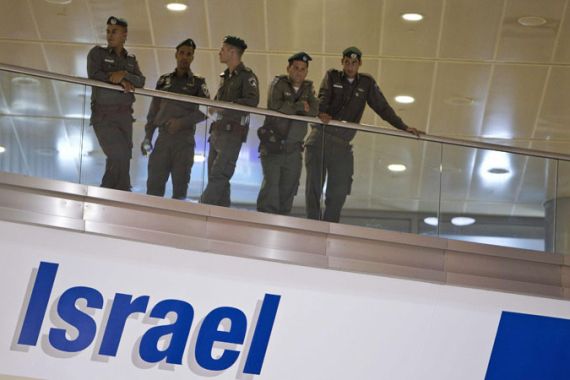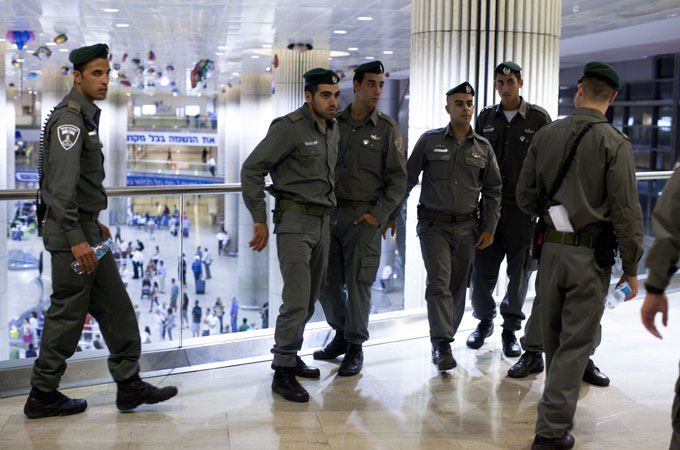Israel’s no fly zone
While it is the lawful right of a country to prohibit air passengers from entering, the move remains controversial.

 |
| Israel has effectively managed to keep most ‘flytilla’ activists from boarding their flights to Tel Aviv [GALLO/GETTY] |
The majority of an estimated 600 Tel Aviv-bound pro-Palestine activists intending to arrive on Friday, July 8 as part of the “Welcome to Palestine” movement have not been allowed to board their flights at originating airports.
The activists, approximately half of which are French nationals, were destined for the West Bank town of Bethlehem. The campaign name “flytilla”, is in reference to a parallel maritime protest flotilla, most of which was never allowed to leave Greek ports from which the ships were to sail.
According to activists involved in the action, the main goal was to show the injustice and human rights violations imposed on Palestinian community by Israel.
Nearly 100 activists were not allowed to board their Lufthansa Air flights at Charles de Galle airport in Paris on Friday morning.
“We came this morning at 4:30 am to get our 6:30 am flight,” Satina, an activist who asked that only her first name be used, told Al Jazeera, “When we arrived and wanted to check in, they told us to go to another check in point, where there they told us they could not check us in. We grouped together and asked why, but they didn’t give us anything in writing.”
Her group then began demonstrating in front of all the airlines that were not allowing the activists to board, shouting “Collaborators, collaborators!” to condemn the French authorities for their action. In addition to Lufthansa, other airlines that disallowed activists from boarding were Air France, Alitalia, Malev Airlines, easyJet, and Swiss Air.
“We asked why they wouldn’t check us in and they would not give a reason, they simply said we could not board this flight,” Satina added.
Most of the passengers not allowed to board are French citizens with valid passports, according to Satina, who said activists were “supposed to go on two Lufthansa flights and one Swiss Air flight in terminal one, and Air Italia and Air France flights in Terminal two.”
A sense of proportionality
Israeli immigration spokeswoman Sabine Hadad admitted that Israel had given airlines a list of 342 “unwanted people” and warned airlines that those passengers would “immediately be turned back at the expense of the companies”.
After the warning was issued, Haddad said, “The companies have already refused to take on board around 200 of these passengers,” and added that two US activists who arrived overnight had already been sent back to the United States.
In Europe, German federal police said as long as passengers had valid tickets and passports, they had no grounds to stop any activists at airports there.
But Swiss Air spokesperson Donzel Jean Claude told Al Jazeera that this issue is regulated by the International Civilian Aviation Organization, and the position of the airlines is clear.
“If a country informs the airline that somebody will not be allowed to enter, that person will not be allowed to board the flight,” he explained, “This problem happens with a lack of visa, or invalid papers, or if in this case we have information from the country these people will not be allowed. For the airline we have to follow it and we cannot transport the passenger.”
Jean Claude said the airline is “legally obliged” to decline boarding said passengers, because “any country has the right to refuse entry. We are obliged to transport somebody having a ticket, but if their papers are not correct or if for some other reason they will be denied entry by the country they are traveling to, then we are not obliged.”
Dr Mark Ellis is the Executive Director of the International Bar Association in London. He told Al Jazeera that, while Israel’s move to bar the passengers from flying is controversial, the country is within its legal right to do so.
“It’s a little like the US no-fly list, in the sense the Homeland Security Department is sending out lists of individuals not allowed to enter the US. This has been controversial, especially in Europe. Anytime a country bars someone from entering and it requires an airline to initiate this, it’s controversial, but it’s not illegal.” Ellis explained that flight restrictions are permitted under a country’s domestic laws.
“Any country has the right to say who may or may not be permitted in the borders of their country.” But he added that he has always maintained that international law requires “a sense of proportionality that pertains to freedom of movement which is a right under international law, so you have to look at if the law that is restricting that freedom of movement to be sure the restrictions on that movement are not unreasonable.”
In this case, said Ellis, Israel finds itself in a strong position, as the country is arguing the move to ban the fliers stems from a security perspective, which gives Israel great latitude to implement flight restrictions. On July 5, Israeli Public Security Minister Yitzhak Aharonovitch called the activists “hooligans” and said they would be barred from entry.
Israeli Police spokesman Micky Rosenfeld said officers deployed at Tel Aviv’s Ben-Gurion International Airport have been prepared to deal with scenarios such as airport officials being attacked or activists settings themselves on fire.
“I can understand why the Israeli government would frame it this way,” Ellis said of Israel’s deeming the activists a security threat, “Because that would strengthen the government’s ability to put these restrictions on.”
We come in peace
Mazin Qumsiyeh is the international media spokesperson for the Welcome to Palestine Campaign in the West Bank, and has stated all along that the goal of the campaign has always been peace.
“The organisers did not come with any intention of demonstrating at the airport or doing anything like that,” Qumsiyeh told Al Jazeera. “Israeli authorities made the mistake of mobilising security on people who are obviously not a security threat.”
Mireille Rumeau, an organiser with the International Solidarity Movement in Paris told Al Jazeera that all of the activists are committed to peaceful methods, and the goal of the action is to highlight Israel’s blockade of the West Bank.
“The goal is very clear, we are all fed up with being obliged to lie when we arrive in Allenby [bridge] or Ben Gurion [Airport] when visiting our Palestinian friends,” she said, “We are fed up with lying about being tourists, or coming for a pilgrimage. Now, we are all going to say: ‘we are coming to visit our Palestinian friends that have invited us.’ If we get through, there are events planned for Palestinian groups for us to take part in, as we were invited by them six months ago, and we are answering their call.”
Organisers chose July 8 for the “fly in” as it is the date in 2004 that the UN’s International Court of Justice issued an advisory opinion that Israel’s West Bank “security fence” stood contrary to international law.
Qumsiyeh’s group has called on airlines not to accept what he calls “provocative, blackmailing, and illegal actions by the Israeli government,” and added, “We are pleased that this episode further exposes Israeli policies towards anything or anyone relating to ‘Palestinians’ as dictatorial, racist, and criminal and not complying with basic elements of democracy or human rights.”
The only way to get to the West Bank is through Israel-controlled crossings – either by arriving at Ben Gurion Airport and driving to the West Bank, or from Jordan, by passing through the Israeli-controlled crossing on the Jordan-West Bank border.
Ellis stated that while travelers between countries have rights under international law, and should be treated with respect and dignity, Israel’s controversial action of banning the activists remains legal.
Nevertheless, Qumsiyeh says that the activists who had their reservations cancelled “will exercise their right of protest including bringing legal cases in their own countries,” and that his group “will also bring legal cases in Israeli courts under our continued attempt to expose the racist policies of the Israeli government.”
Follow Dahr Jamail on Twitter: @DahrJamail